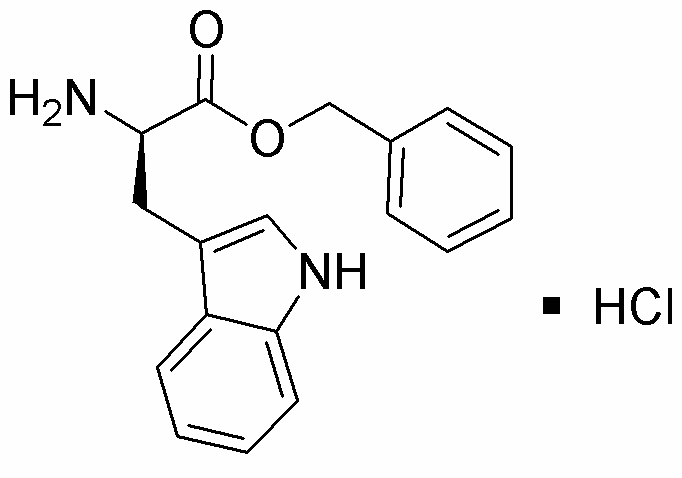D-Tryptophan benzyl ester hydrochloride is widely utilized in research focused on
- Pharmaceutical Development: This compound serves as a precursor in synthesizing various pharmaceuticals, particularly those targeting neurological disorders, enhancing mood and sleep quality.
- Biochemical Research: It is used in studies investigating protein synthesis and enzyme activity, providing insights into metabolic pathways and cellular functions.
- Food Industry: As a flavor enhancer, it can be incorporated into food products to improve taste and aroma, appealing to consumers seeking natural ingredients.
- Cosmetic Formulations: The compound is included in skincare products for its potential to promote skin health and improve hydration, catering to the growing demand for effective cosmetic solutions.
- Neuroscience Studies: It is employed in research examining the effects of tryptophan derivatives on serotonin levels, which is crucial for understanding mood regulation and mental health.
General Information
Properties
Safety and Regulations
Applications
D-Tryptophan benzyl ester hydrochloride is widely utilized in research focused on
- Pharmaceutical Development: This compound serves as a precursor in synthesizing various pharmaceuticals, particularly those targeting neurological disorders, enhancing mood and sleep quality.
- Biochemical Research: It is used in studies investigating protein synthesis and enzyme activity, providing insights into metabolic pathways and cellular functions.
- Food Industry: As a flavor enhancer, it can be incorporated into food products to improve taste and aroma, appealing to consumers seeking natural ingredients.
- Cosmetic Formulations: The compound is included in skincare products for its potential to promote skin health and improve hydration, catering to the growing demand for effective cosmetic solutions.
- Neuroscience Studies: It is employed in research examining the effects of tryptophan derivatives on serotonin levels, which is crucial for understanding mood regulation and mental health.
Documents
Safety Data Sheets (SDS)
The SDS provides comprehensive safety information on handling, storage, and disposal of the product.
Product Specification (PS)
The PS provides a comprehensive breakdown of the product’s properties, including chemical composition, physical state, purity, and storage requirements. It also details acceptable quality ranges and the product's intended applications.
Certificates of Analysis (COA)
Search for Certificates of Analysis (COA) by entering the products Lot Number. Lot and Batch Numbers can be found on a product’s label following the words ‘Lot’ or ‘Batch’.
Numéro de catalogue
Numéro de lot/série
Certificates Of Origin (COO)
This COO confirms the country where the product was manufactured, and also details the materials and components used in it and whether it is derived from natural, synthetic, or other specific sources. This certificate may be required for customs, trade, and regulatory compliance.
Numéro de catalogue
Numéro de lot/série
Safety Data Sheets (SDS)
The SDS provides comprehensive safety information on handling, storage, and disposal of the product.
DownloadProduct Specification (PS)
The PS provides a comprehensive breakdown of the product’s properties, including chemical composition, physical state, purity, and storage requirements. It also details acceptable quality ranges and the product's intended applications.
DownloadCertificates of Analysis (COA)
Search for Certificates of Analysis (COA) by entering the products Lot Number. Lot and Batch Numbers can be found on a product’s label following the words ‘Lot’ or ‘Batch’.
Numéro de catalogue
Numéro de lot/série
Certificates Of Origin (COO)
This COO confirms the country where the product was manufactured, and also details the materials and components used in it and whether it is derived from natural, synthetic, or other specific sources. This certificate may be required for customs, trade, and regulatory compliance.


